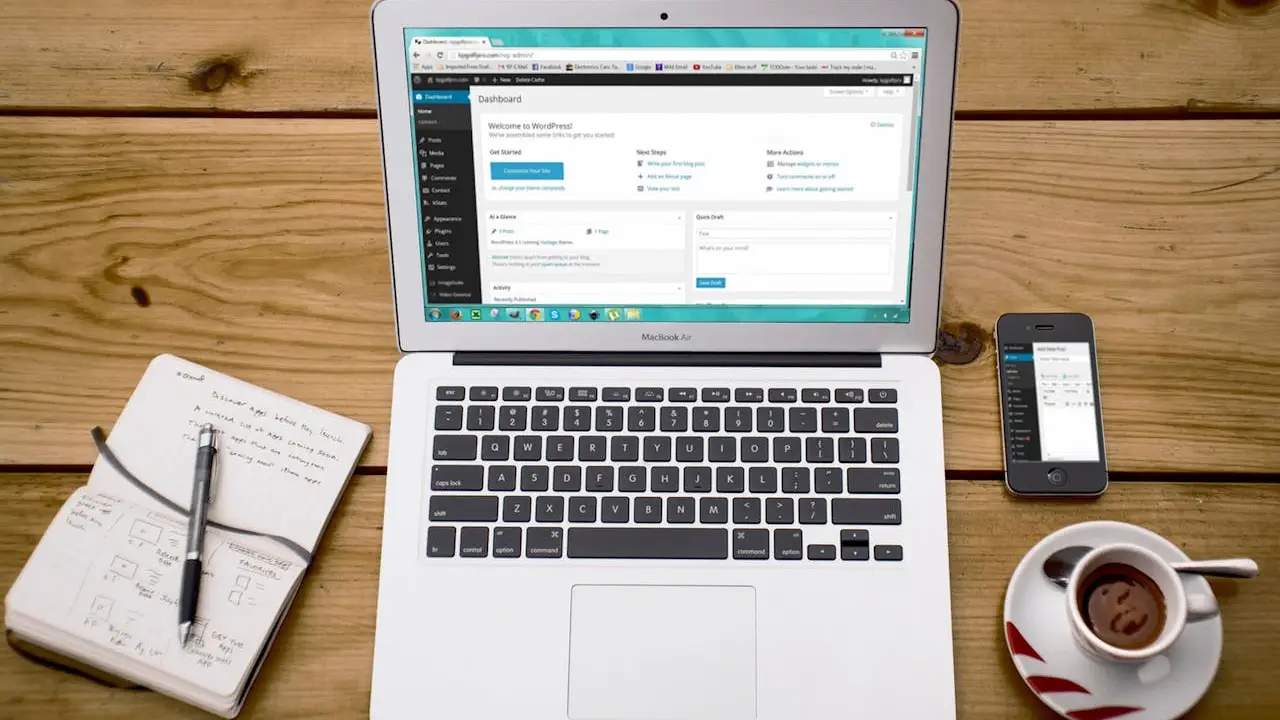This helps understand a site’s underlying structure and offers targeted web services. WordPress powers a significant part of the world, so being able to identify it can be a useful skill for developers and marketers as well as casual users. In this guide, we will show you several ways on how to see if a website is WordPress, and we will also discuss the importance of this for website management and optimization.
What is WordPress?
Before we get into methods for finding a WordPress website, let us first have a look at what WordPress means. WordPress is an open-source content management system (CMS) for building and managing websites. Invented in 2003, it has evolved over time into the world’s most widely used CMS, powering more than 40% of all existing websites. These sites range from simple blogs and small company websites to large e-commerce sites and major news outlets.
For website owners, WordPress development services have now made it easier to launch and maintain their websites since it is user-friendly and flexible, with its vast ecosystem of themes and plugins.
Key Indicators that Reveal a Website is Built on WordPress
While trying to determine how to see if a website is WordPress, several visual as well as technical clues may be considered. These include everything from the tiniest traces in a URL structure to specific WordPress-centric files in its source code.
1. URL Structure
Another simple way you can distinguish a WordPress site from others is through its URL structure. It often has “/wp-admin/” or “/wp-login.php” in their login page urls. Sample login page URL for WordPress site is www.example.com/wp-admin/.
Additionally, WordPress often generates URLs that contain query parameters, such as /?p=123. Although WordPress allows you to customize permalinks, this is another strong indicator of a WordPress site.
2. Login Page
When in doubt about whether a site is built on WordPress, try tacking on either /wp-admin/ or /wp-login.php to the site’s URL. If so, this link will take you to the page managers use to log in. Seeing a screen that requests a username and password usually means that the website is indeed using WordPress.
3. Page Source Code
By inspecting the page source, you can often find WordPress-specific identifiers. To do this:
- Right-click on any webpage and select “View Page Source” (or “Inspect” in some browsers).
- After that, try to find “wp-content” in the source code. Themes, plugins, and other stuff related to WordPress installations are contained in this directory. If it shows up in source code, chances are that the given site is a WordPress site.
- Other signs include references to files in the wp-includes and wp-admin folders.
These references often include scripts, stylesheets, and media files that WordPress automatically generates.
Unlock the Power of WordPress for Your Business
Let Us Help You Leverage the Same Technology for Your Business Growth
Tools to Check if a Website is Powered by WordPress
In addition to manual methods, there are several online tools and browser extensions that make identifying a WordPress website easier.
1. IsItWP
IsItWP is an easy-to-use tool that could check whether a given URL is powered by WordPress or not. The tool crawls through the entire webpage and immediately returns findings such as themes and plugins being used on that website.
2. Wappalyzer
Wappalyzer is another browser extension that detects technology stacks behind a website. This is awesome for quickly identifying whether a site uses WordPress, plus other detail about the CMS, the e-commerce platform, analytics tools, and much more in one go, especially if you don’t want to inspect the code or visit websites.
3. BuiltWith
BuiltWith is a more comprehensive website profiling tool. It provides an extensive breakdown of the technologies used on a website, including WordPress. It also lists related technologies, such as hosting platforms, e-commerce tools, and analytics software.
Manual Methods to Identify a WordPress Website
Website detection was automated through tools, but it can be done manually as well, as good and cost-effective methods. The source of a page can be checked for certain markers or specific URL patterns that often belong to WordPress sites. If unsuccessful, check if common WordPress plugins or themes are included in the website structure. These steps could lead you to clear proof that a website is powered by WordPress.
If you are a business that offers or responsive website development services or B2B web design agency services, knowing how to detect WordPress sites is an added feature to your services. It would help tailor your solutions to particular platforms for optimum design, user experience, and performance across devices.
1. Meta Tags in the Source Code
WordPress often includes a generator meta tag in the HTML source code that specifies the version of WordPress the site is running. Look for a line like this:
html
Copy code
<meta name=”generator” content=”WordPress 5.7.1″ />
Although some WordPress sites may hide or remove this meta tag for security reasons, it’s still a common clue.
2. Theme and Plugin Names in CSS and JavaScript Files
If a WordPress website is using a specific theme or plugin, its name may be embedded in the CSS or JavaScript files. For example, you might find a URL like wp-content/themes/your-theme-name/style.css. This URL shows that the website is using a theme located in the WordPress theme directory.
3. Check the Footer
Some WordPress websites have a footer note that says “Proudly powered by WordPress.” While many modern websites remove this footer for branding reasons, some older sites or custom WordPress themes may still feature it.
How to Use Google Analytics to Identify a WordPress Website
Google Analytics can also provide clues about whether a website is built with WordPress. By tracking certain metrics and referral sources, you can sometimes identify WordPress-powered sites. For example, How to see if a website is WordPress? WordPress websites tend to have specific behavior in traffic sources, with plugins like Jetpack often sending distinct referral patterns in Analytics.
Additionally, sites built on WordPress can show distinctive user-agent strings in Google Analytics, which might indicate that the site uses WordPress plugins or other WordPress-specific technologies.
Want to Learn More About WordPress and Its Benefits?
Schedule a Free Strategy Session with Us
Benefits of Knowing If a Website is Powered by WordPress
Knowing how to see if a website is WordPress has practical benefits for businesses, web developers, and marketers. For example, if you offer website maintenance services, understanding the platform powering a site helps you tailor your services to its needs. WordPress sites require regular maintenance, updates, and security patches to keep them running smoothly.
Similarly, identifying WordPress sites enables you to offer WordPress development services, including custom theme and plugin development, integration with third-party tools, and performance optimization. For businesses, recognizing WordPress also makes it easier to plan for website redesign services, especially since WordPress has a vast ecosystem of pre-built themes and templates.
Using WordPress for SEO and Marketing
WordPress isn’t just popular for its ease of use and flexibility; it’s also a powerful platform for SEO. With the right plugins and optimizations, WordPress websites can rank highly on search engines. Many marketers and developers specialize in SEO for shopify bradford or other CMS platforms but WordPress offers built-in features like customizable meta tags, image alt text, and SEO-friendly permalinks that make optimization easier.
Furthermore, for online stores, WordPress combined with WooCommerce offers a robust e-commerce solution. Shopify maintenance services can also help maintain online stores, but WordPress provides more flexibility and customization.
Conclusion
Knowing if a website is built on WordPress or not can be very useful for various reasons. For example, businesses may be more focused on converting their website optimization efforts into more streamlined results, or developers and marketers might be able to work on dedicated solutions to provide better performance. This can easily be achieved by inspecting the page source or through using tools like IsItWP and Wappalyzer to tell how to see if a website is WordPress.
Identify WordPress sites and leverage the features it provides to foster better interaction and improved search engine optimization. Depending on what services you are offering-the website-having-or even a solution in itself-having an understanding of WordPress will assist you in providing a more efficient solution to improve the site’s performance and user experience. You can also have the average cost of website design for small business and even implement google tag management consulting services or google analytics consulting services as part of maximizing the site functionality and tracking analytics.






Leave a Reply